The current governmental system of New Libertaria is classified as a Constitutional Monarchy. The Head Of State is a monarch. The Head Of Government is a Prime Minister who presides over a 1,000-seat House Of Electors. Members of the House Of Electors are referred to by the title "alderman."
Partisan Breakdown In The House Of Electors[]
The House Of Electors is currently under the control of the Right Coalition as the Majority. The Left Coalition currently enjoys a minority status in the House Of Electors. The Right Coalition in the House Of Electors is currently 555 seats out of 1,000. The New Conservative Party (NCP) has 324 Electors. The Conservative Centrist Party (CCP) has a membership of 158 Electors. The New Hanseatic Party (NHP) currently seats 41 Electors. The Law And Morality Party (LAMP) currently seats 27 Electors. The Left Coalition in the House Of Electors is currently 445 seats out of 1,000. The Progressive Centrist Party (PCP) has 186 Electors. The Liberal Social Democrats (LSD) have a membership of 178 Electors. The National Independent Party (NIP) seats 80 members and the Communist Labor Congress (CLC) holds one independent seat by district election and always caucuses with the minority coalition.
| Seats | Party | Political Description |
|---|---|---|
| 324 | New Conservative Party | "Classical Liberalism" - Conservative Economic Policy and Center-Right Social Policy. |
| 158 | Conservative Centrist Party | "Communitarians" - Center-Right Populist Economic Policy and Moderate Social Policy. |
| 41 | New Hanseatic Party | "Market Capitalists" - Free-Market Conservative Economic Policy and Moderate Social Policy. |
| 27 | Law And Morality Party | "Religious Right" - Center-Right Economic Policy and Traditionalist-Moralistic Social Policy. |
| Seats | Party | Political Description |
|---|---|---|
| 186 | Progressive Centrist Party | "Communitarian Liberalism" - Liberal Economic Policy and Center-Left Social Policy. |
| 178 | Liberal Social Democrats | "Democratic Socialists" - Progressive-Left Statist Economic Policy and Far-Left Social Policy. |
| 80 | National Independent Party | "The Moderate Centrists" - Center-Left Economic Policy and Center-Right Social Policy. |
| 1 | Communist Labor Congress | "The Radical Left" - Marxist-Leninist Economic Policy and Authoritarian Social Policy. |
Parties Of The Right Coalition (Majority)[]
New Conservative Party[]
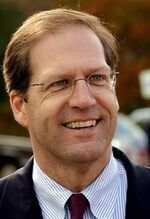
Douglas Butcher
Ideology: "Classical Liberalism"
Party Leader: Prime Minister Douglas Butcher
The New Conservative Party can best be classified as the mainstream right. The philosophy of the NCP is in keeping with the traditions of classical liberalism. It is committed to the ideal of limited government and liberty of individuals including freedom of religion, speech, press, and assembly, and free markets. Modern classical liberals trace their ideology to ancient Greece, the Roman republic and the Renaissance. They cite the 16th century School of Salamanca in Spain as a precursor, with its emphasis on human rights and popular sovereignty and its moral defense of commerce.
Rationalist philosophers of the 17th Century, such as Thomas Hobbes and Baruch Spinoza developed further ideas that would become important to liberalism, such as the social contract. However, liberalism's classic formulation came in The Age of Enlightenment. John Locke's Two Treatises of Government argued that legitimate authority depended on the consent of the governed, while Adam Smith's The Wealth of Nations rejected mercantilism, which advocated state interventionism in the economy and protectionism, and developed modern free-market economics. In the modern dichotomy of left-right politics, this form of classical liberalism is more identified with conservatism and libertarian philosophy.
On social issues, the NCP supports a center-right position which emphasizes traditional views of social units such as the family and religious institutions. These positions often entail defining marriage as relationships between one man and one woman (thereby prohibiting same-sex unions and polygamy) and laws prohibiting the practice of abortion. While many New Conservatives believe that government should have a role in defending moral values, others have advocated a hands-off government where social values were concerned. On military issues and matters of defense, the New Conservative Party has a foreign policy that would be described as neoconservative and supports a strong national defense.
Electoral History: The New Conservative Party has enjoyed success over the years, splitting the Right Coalition vote with the CCP. Wendell Chumway, the first Prime Minister under the Third Constitution was a member of the NCP. Other Prime Ministers have included Landon Wilkes, Richard Trick, Lyndon Silverlake and Robert De Froot. The current leader of the party is Prime Minister Douglas Butcher.
Conservative Centrist Party[]
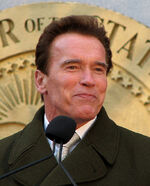
Aloysius Blackmun
Ideology: "Communitarianism"
Party Leader: Deputy Prime Minister Aloysius Blackmun
The Conservative Centrist Party can best be classified as the moderate right. The philosophy of the CCP is a part of the communitarian thread of politics in New Libertaria. Central to the communitarian philosophy is the concept of positive rights, which are rights or guarantees to certain things. Communitarians claim values and beliefs are formed in public space, in which debate takes place. The dependence of the individual upon community members is typically meant as descriptive and does not mean that individuals should accept majority beliefs. Rather, if an individual rejects a majority belief, such as the historic belief that slavery is acceptable, he or she will do so for reasons that make sense within the community (for example, the Judeo-Christian conception of the imago Dei, or reasons deriving from secular Enlightenment humanism) rather than simply any reason at all. In this sense, the rejection of a single majority belief relies on other majority beliefs.
While the communitarian conservatives generally advocate for the private sector, the CCP also supports a variation on the concept of noblesse oblige, which is translated as "nobility obliges." "Noblesse oblige" is generally used to imply that with wealth, power and prestige come responsibilities. In ethical discussion, it is sometimes used to summarize a moral economy wherein privilege must be balanced by duty towards those who lack such privilege or who cannot perform such duty. Finally, it has been used recently primarily to refer to public responsibilities of the rich, famous and powerful, notably to provide good examples of behavior or to exceed minimal standards of decency.
On social issues, Conservative Centrists stand out for their strong religious faith and conservative views on many moral issues. They also express broad support for a social safety net, which sets them apart from other Right Coalition groups. They are skeptical about the effectiveness of the marketplace, favoring government regulation to protect the public interest and government assistance for the needy. On military issues and matters of defense, the Conservative Centrist Party has a foreign policy that would be described as conservative and supports a strong national defense.
Electoral History: The Conservative Centrist Party has enjoyed success over the years, although it has existed mainly in the shadow of the NCP. The first prime minister to form a government under the CCP banner was Prime Minister Jefferson Wett. Other Prime Ministers have included Leslie King and Johan Abelsson. Although officially listed as a Coalition Prime Minister, Sebastian Saltonstall and Anders Johnson have both been leaders of the CCP.
New Hanseatic Party[]
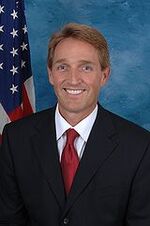
Geoffrey de Vlok
Ideology: "Market Capitalists"
Party Leader: Alderman Geoffrey de Vlok
The New Hanseatic Party can best be classified as advocates of pure capitalism, aligning them closer to the NCP than the CCP on key economic issues. The guiding philosophy of the NHP is fiscal responsibility. They believe strongly in free trade and are committed to lowering the budget, paying off national debt, and acquiring a balanced budget. Where fiscal conservatism gets more diverse in ideals within the NHP is what steps should be taken to balance the budget. Deficit hawks are more willing to increase taxes in addition to cutting spending to balance the budget than anti-government Hanseatics, who want to "starve the beast" by cutting taxes for the purpose of decreasing tax revenue which they hope will cause the government to spend less, and supply-siders, who believe the best way to gain tax revenue is through deep across-the-board tax cuts that they believe will end up completely paying for themselves through the economic growth they cause.
The New Hanseatic Party is named in honor of the Hanseatic League. The Hanseatic League (also known as the Hanse or Hansa) was an economic alliance of trading cities and their guilds that established and maintained a trade monopoly along the coast of Northern Europe. It stretched from the Baltic to the North Sea and inland, during the Late Middle Ages and early modern period (c.13th–17th centuries). The Hanseatic cities had their own law system and furnished their own protection and mutual aid, thus having a sort of a political autonomy and in some cases creating a political entities of their own.
The political platform of the NHP reflects a belief in favoring minimally regulated, laissez-faire markets, strong civil liberties, minimally regulated migration across borders, and non-interventionism in foreign policy that respects freedom of trade and travel to all foreign countries. Within the NHP, the debate that has survived the longest is referred to as the anarchist-minarchist debate. Ultimately, anarchists and minarchists within the Party agreed to "cease fire" about the specific question of whether governments should exist at all, and focus on promoting voluntary solutions to the problems caused by government instead. A related internal discussion concerns the philosophical divide over whether the Party should aim to be mainstream and pragmatic, or whether it should focus on being consistent and principled.
On social issues, New Hanseatics are very indifferent on social issues, preferring to focus its advocacy on entrepreneurial policies. On military issues and matters of defense, the New Hanseatic Party has a foreign policy that would be described as conservative and pro-military but is opposed vehemently to interventionist policies.
Electoral History: Never gaining enough electoral support to lead a government, the NHP has been a vital part of many Right Coalition governments over the years, espousing a strong advocacy for fiscal conservatism.
Law & Morality Party[]
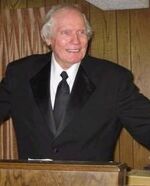
Phillip Friedrich
Ideology: "Religious Right"
Party Leader: Alderman Phillip Friedrich
The Law And Morality Party can best be classified as the hard right on social issues. The party has historically drawn together political and social movements and organizations characterized by their strong support of conservative social and political values. The politically active social movement of the religious right includes individuals from a wide variety of conservative theological beliefs, ranging from traditional movements within Baptist, Mormonism, and Calvinism that are theologically conservative to similar groups which exists within Jewish, Muslim and Hindu sects with social conservatism as a guiding principle.
The central issue of LAMP has traditionally been the issue of abortion. LAMP maintains that human fetuses and embryos are persons, and therefore have a right to life. The Law And Morality Party has also been associated with opposition to euthanasia, human cloning, and research involving human embryonic stem cells. LAMP has historically been split on the issue of the death penalty, with some believing in the “seamless garment of life” while others recognize it as a maintenance of order in a just society. On economic issues, LAMP advocates for positions similar to the NCP, but more towards a center-right position. On military issues and matters of defense, LAMP has a foreign policy that would be described as ultra-conservative and supports a strong national defense.
Electoral History: Never gaining enough electoral support to lead a government, the Law And Morality Party has been a strong voice for social conservatives until the most recent elections signalled a move to the radical fringe - leading to defections of mainstream traditionalists to the NCP and isolating LAMP politically towards the politics of extremism. The last election showed a poor turnout for LAMP over dual controversies. LAMP was involved in controversy surrounding attacks on PCP Leader Baruch Soetero, claiming that the half-Dutch, half-Maori politician was born in Norway. Rumors also circulated by LAMP that the ostensibly Jewish Soetero was secretly a Norseman who worshipped Thor (referring to him as "The Norwegian") damaged their credibility. The party also found itself losing credibility with new leadership under Phillip Friederich taking the party towards a more extreme postion on homosexuality, with the unusually hateful rhetoric being condemned by the Left Coalition as well as by the New Conservative Party, Conservative Centrist Party and New Hanseatic Party. Some have questioned the long-term viability of the party as an electoral force, given recent calls by LAMP to abolish the Ecumenical Council in favor of a Theorcratic Council.
Parties Of The Left Coalition (Minority)[]
Progressive Centrist Party[]
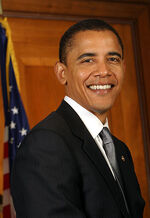
Baruch Soetero
Ideology: "Communitarian Liberalism"
Party Leader: Minority Leader Baruch Soetero
The Progressive Centrist Party can best be classified as the mainstream left, if such a thing exists. In the conventional political spectrum, the party lies on the center-left. The party grew out of the trade union movement and socialist political movements of the 19th century seeking workers' representation, and describes itself as a "democratic socialist party". They are advocates of a larger government and adopt a Keynesian approach to spending, arguing that government has an obligation to deficit-spend in economic difficulties.
Progressive Centrists support a more progressive tax structure to provide more services and reduce economic inequality. Currently they have proposed increasing taxes on the wealthiest citizens while wishing to keep in place those given to the middle class. The PCP supports more government spending on social services while spending less on the military. They oppose the cutting of social services and various welfare programs, believing it to be harmful to efficiency and social justice. Progressive Centrists believe the benefits of social services, in monetary and non-monetary terms, are a more productive labor force and cultured population, and believe that the benefits of this are greater than any benefits that could be derived from lower taxes, especially on top earners, or cuts to social services. Furthermore, PCP members see social services as essential towards providing positive freedom, i.e. freedom derived from economic opportunity.
On social issues, the PCP supports a center-left position which generally rejects a traditional approach, but also rejects abject radicalism. The PCP is pro-choice and pro-gay rights. On military issues and matters of defense, the Progressive Centrist Party has a foreign policy that would be described as critical of the military and supports diplomacy and a globalist approach to world affairs.
Electoral History: The Progressive Centrist Party has been the dominant Left Coalition Party in New Libertaria. The first Left Coalition in the House Of Electors was led by Prime Minister Teofilo Adler. Other notable Prime Ministers who have headed PCP governments include Bender Farnsworth, Edward Moore, Fritz Vallée, William Horton, Alvin Blood and Jan van der Heinz. The PCP had a major scandal in the Moore Administration in which Prime Minister Edward Moore was impeached after his conviction for vehicular manslaughter.
Liberal Social Democrats[]

Richard Cranium
Ideology: "Democratic Socialists"
Party Leader: Alderman Richard Cranium
The Liberal Social Democrats are a formally organized political party based on the principles of Green politics. These principles include social justice, reliance on grassroots democracy, nonviolence, and support for environmentalist causes. "Greens" believe that the exercise of these principles leads to world health. They propose a political theory similar to the principles of Rawlsianism, advocated by John Rawls, which takes as its starting point the argument that "most reasonable principles of justice are those everyone would accept and agree to from a fair position." Like Rawls, the Liberal Social Democrats employ a number of thought experiments—including the famous veil of ignorance—to determine what constitutes a fair agreement in which "everyone is impartially situated as equals," in order to determine principles of social justice. The party also bears similar qualities to Fabian Socialism.
The LSD members are most likely to be skeptical of an individual's ability to succeed without impediments and are strongly anti-business. The LSD has a strong belief that government should do more to help the poor, yet most are disenchanted with government. They are adamantly and strongly supportive of organized labor .
In its Manifesto Of Principles, the LSD advocated two major societal renewals: Firstly, a spiritual renewal, which sought to replace a society based on fear, division and power with a society based on trust, unity and justice - this reflected the party's pacifism. Secondly, an economic renewal, which sought to replace a society based on classes by a classless society. This reflected the party's socialism. The WSP furthermore advocated a democratic political system and a democratic economy, it rejected the use of violence to solve international conflicts and it proposed a federal world state in which wealth would be shared by both the former colonizing powers and their former colonies.
Over time, new issues were incorporated into the LSD ideology: women's liberation, gay rights and environmentalism. On military issues and matters of defense, the Liberal Social Democrats are pacifist and support drastic cuts to the military.
Electoral History: Although the Liberal Social Democrats have never had enough political support to form an outright government, the LSD has been a vital part of the Left Coalition. Although not recognized officially, George Van Ruhle, who served as Interim Prime Minister, was a leader of the LSD as Deputy Prime Minister under Edward Moore. Notable Deputy Prime Ministers include Wolfgang Zenith, Johnson Rochefoucauld, and Alain Sizsky.
National Independent Party[]
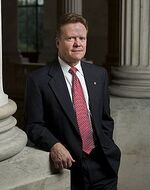
James Van Netz
Ideology: "Moderate Centrists"
Party Leader: Alderman James Van Netz
The National Independent Party is a group of moderate-to-conservative members of the Left Coalition committed to financial and national security, favoring compromise and bipartisanship over ideology and party discipline. Religious orientation and conservative views set this group apart from other Left Coalition groups on many social and political issues. The NIP political views are moderate with respect to key policy issues such as foreign policy, regulation of the environment and the role of government in providing a social safety net. Their neutrality on assistance to the poor is linked, at least in part, to their belief in personal responsibility.
National Independents are less extreme on moral beliefs than core conservative groups, but most oppose gay marriage and the acceptance of homosexuality, and support a more active role for government in protecting morality and are generally no more conservative than the national average on other social issues such as abortion and stem-cell research. On military issues and matters of defense, the National Independents are considered hawkish and advocate on behalf of a strong military and support a commitment to military spending.
Electoral History: Always the contrarians, the National Independent Party has formed partnerships in both the Left and Right Coalitions. Having marginal success, they have been the pivotal voice on a number of issues. The NIP had its greatest success under Prime Minister Anders Johnson, but has been in a holding pattern over the years as membership has aged.
Communist Labor Congress[]
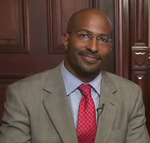
Morrison Smith
Ideology: "Radical Left"
Party Leader: Alderman Morrison Smith
The Communist Labor Congress seats one member. Unable to break the threshold for proportional representation, Alderman Morrison Smith was elected by direct election via constituency vote. The CLC follows a doctrinaire Marxist-Leninist philosophy, interpreted via revolutionary socialism. The CLC organizes on the need for fundamental social change through revolution by mass movements of the vast majority, as a strategy to achieve a socialist society. The CLC engages the political system, with the advocacy of the possibility of gradual change as a means of achieving socialism or of ameliorating capitalism, and also in contrast to the concept of small revolutionary groups seizing power without active mass support.
The Communist Labor Congress supports the three tenets of Marxism:
The dialectical and materialist concept of history — Humankind's history is fundamentally that of the struggle between social classes. The productive capacity of society is the foundation of society, and as this capacity increases over time the social relations of production, class relations, evolve through this struggle of the classes and pass through definite stages (primitive communism, slavery, feudalism, capitalism). The legal, political, ideological and other aspects (ex. art) of society are derived from these production relations as is the consciousness of the individuals of which the society is composed.
The critique of capitalism — In capitalist society, an economic minority (the bourgeoisie) dominate and exploit the working class (proletariat) majority. Marx uncovered the interworkings of capitalist exploitation, the specific way in which unpaid labor (surplus value) is extracted from the working class (the labor theory of value), extending and critiquing the work of earlier political economists on value. Although the production process is socialized, ownership remains in the hand of the bourgeoisie. This forms the fundamental contradiction of capitalist society. Without the elimination of the fetter of the private ownership of the means of production, human society is unable to achieve further development.
Advocacy of proletarian revolution — In order to overcome the fetters of private property the working class must seize political power internationally through a social revolution and expropriate the capitalist classes around the world and place the productive capacities of society into collective ownership. Upon this, material foundation classes would be abolished and the material basis for all forms of inequality between humankind would dissolve.
The CLC is active in the environmental community. The CLC proposes active action to thwart national security interests including armed resistance to police and the military.
Electoral History: The Communist Labor Congress has had virtually no political support over the years, unable to reach the threshold for proportional representation in any election. However, the CLC has been able to gain the occasional seat through district vote, often in areas with disaffected PCP and LSD voters.
Proportional Representation Threshhold[]
Although the Party Vote seats membership based on proportional representation, parties not reaching a threshhold of 2.5 percent are not seated. Parties appearing on the ballot, but not meeting the threshold percentage of votes to seat members in the House Of Electors include the New Libertarian Rexist Party (NLRP), the Emancipation, Ecology & Equality Party (EEEP), New Syndicalist Labor Party (NSLP), the Peace & Prosperity Party (3P!), and the Secular Humanist Party (SHP). Each of these parties received well below one percent of the vote in party voting.